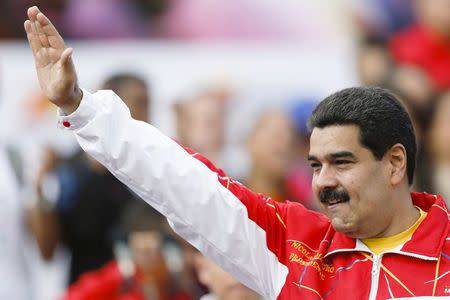Venezuela's Maduro says 'no rush' to hike world's cheapest gasoline

By Alexandra Ulmer and Diego Ore CARACAS (Reuters) - Venezuela's Nicolas Maduro said there was "no rush" to hike the world's cheapest gasoline prices, suggesting the increasingly unpopular president has shied away from implementing the risky domestic reform in the near future amid an economic crisis. "I've considered, as head of state, that the moment has not arrived," he said in a pre-recorded interview broadcast on the Televen channel on Sunday. "The moment will come, maybe in 2015, there's no rush, we're not going to throw more gasoline on the fire that already exists with speculation and induced inflation." Venezuela's economy is flailing under the weight of an over 60 percent annual inflation, an apparent recession, strict currency controls, and slipping oil prices. Maduro has appeared reluctant to make necessary but unpopular economic adjustments, such as hiking gasoline prices for the first time in two decades or unifying the country's complex system of exchange rates. Subsidizing the world's cheapest gasoline costs the South American OPEC member about $12.5 billion a year, according to the government. But raising prices is a hot-button issue in the country with the world's largest crude reserves. A gasoline price hike in 1989 triggered massive riots and left hundreds dead. A hike now would likely also further fan the region's highest inflation rate and especially hurt the poor, the government's traditional base of support. Separately, Maduro reiterated his government is working on an "adjustment" to the "Sicad II" foreign exchange auction scheme, but did not offer details. "FINANCIAL BLOCKADE" Maduro blames the economic crisis on a "war" waged by right-wing foes seeking to topple him by spreading rumors of impending default, as well as smuggling and hoarding price-fixed goods. "There's a blockade against Venezuela in the capitalist world," Maduro told interviewer Jose Vicente Rangel, a leftist politician and former vice-president during Chavez's government. Venezuelan sovereign bond prices have plunged and the cost to insure the debt against a default has surged as slumping oil prices worsen the country's cash flow problems. Maduro reiterated that Venezuela is "solvent" and said the market ignores that the country has paid its debt consistently since the late Hugo Chavez came to office in 1999. "Next week they're going to try to mount a little campaign saying Venezuela is going to default," added Maduro, who was elected last year to replace Chavez. (Writing by Alexandra Ulmer; Editing by Rosalind Russell)

